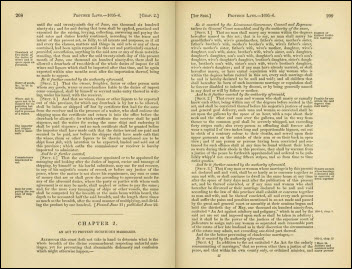Look elsewhere for the answer
Reader Noel Ferre found himself perplexed.
“I found a court record, Maine 1695,which states only ‘Abraham Preble, married contrary to law,’” he wrote. “What would the law have been at that time?”
 A great question, because it reminds us all of something all of us — The Legal Genealogist included — so often forget: Maine wasn’t one of the original 13 colonies.
A great question, because it reminds us all of something all of us — The Legal Genealogist included — so often forget: Maine wasn’t one of the original 13 colonies.
Oh, the land was included in the area of those original colonies.
But not as the separate jurisdiction of Maine.
No, what we know today as Maine was part of Massachusetts.
Although folks in Maine had been campaigning vigorously for statehood for years, the Massachusetts General Court didn’t begin the process of separating Maine out until June of 1819, when it passed enabling legislation for the District of Maine. That was followed immediately, in July of 1819, by Maine voters approving the first steps towards statehood.1
Then there needed to be two more votes in Massachusetts plus the adoption of a constitution in Maine2 and a pesky little matter of Maine being a free state and upsetting the balance between free and slaveholding states. The result was the Missouri Compromise: Maine came into the union as a free state, Missouri as a slave state.3
Bottom line for Noel: at that time in the late 17th century, the area of Maine was part of Massachusetts, so to find out what the marriage laws were in Maine, you need to look in the statutes of Massachusetts.
The first marriage law passed in Massachusetts was in November, 1692, and it gave justices of the peace and ministers the power to solemnize marriages if the banns had been posted for 14 days before the marriage.4
Then in June of 1694, a second law was passed addressing adultery and polygamy. It set the punishment for adultery at whipping, and the punishment for marrying if the person had a spouse still living at death.5
Finally, for Noel’s purposes, on 19 June 1695, an act was passed entitled An Act to Prevent Incestuous Marriages. It set out, in detail, those who were ineligible to marry because they were too closely related by blood or marriage:
That no man shall marry any woman within the degrees hereafter named in this act ; that is to say, no man shall marry his grandfather’s wife, wive’s grandmother, father’s sister, mother’s sister, father’s brother’s wife, mother’s brother’s wife, wive’s father’s sister, wive’s mother’s sister, father’s wife, wive’s mother, daughter, wive’s daughter, son’s wife, sister, brother’s wife, wive’s sister, son’s daughter, daughter’s daughter, son’s son’s wife, daughter’s son’s wife, wive’s son’s daughter, wive’s daughter’s daughter, brother’s daughter, sister’s daughter, brother’s son’s wife, sister’s son’s wife, wive’s brother’s daughter, wive’s sister’s daughter ; …6
There were other provisions in these laws: setting the age of consent at 14 for males and 12 for females,7 requiring parental consent for marriages of those who were minors8 and the like.
So Abraham Preble may have married without banns, without parental consent, or someone the law didn’t allow him to marry — just as the key examples.
But to find the answer? We’re back to The Legal Genealogist‘s mantra: to understand the records, we have to understand the law — and not just law in general, but the precise law in effect at the time and in the place where the record was created.
In this case, for Maine resident Abraham Preble, that means looking at the laws of Massachusetts.
SOURCES
- See “Massachusetts Loses Maine: March 15, 1820,” Mass Moments (http://www.massmoments.org/ : accessed 14 Aug 2017). ↩
- See Liam Riordan, “Maine Statehood: An Overview,” University of Maine (https://umaine.edu/ : accessed 14 Aug 2017). ↩
- “Missouri Compromise,” History.com (http://www.history.com/ : accessed 14 Aug 1817). ↩
- Chapter 25, Province Laws of 1692-3, in Acts and Resolves … of the Province of the Massachusetts Bay… (Boston: Wright & Potter, State Printers, 1869), 61; digital images, Internet Archive (http://www.archive.org : accessed 14 Aug 2017). ↩
- Chapter 5, Province Laws of 1694-5, in ibid., 171-172. ↩
- §1, “An Act to Prevent Incestuous Marriages,” Chapter 2, Province Laws of 1695-6, in ibid., 209. ↩
- See Chapter 25, Province Laws of 1692-3, in ibid., 61. ↩
- See ibid. And see §4, Chapter 2, Province Laws of 1695-6, in ibid., 210. ↩



Judy, thank you for this post. I’m just beginning to research my Mainers, the Pillsbury and Cooper families. No relation to the doughboy! When I visit NEHGS soon, I’ll be able to properly focus my research.
Glad you found it useful, and good luck with your research!
Because of ancestral searches, I finally am interested in World History, something that never sparked me in my earlier days. With the search of my lineage, I realized in order to understand why I am here, it is necessary to learn what was happening in the world throughout recorded time. It’s fascinating and mysterious and sometimes down right sad.
Every family’s history is “fascinating and mysterious and sometimes down right sad” when you come right down to it.
Judy, I am just now getting around to reading this. Thank you for this tidbit of the law at the time. I knew the history of Maine, but this really hones it down for me.
So glad you found this useful, Peggy!